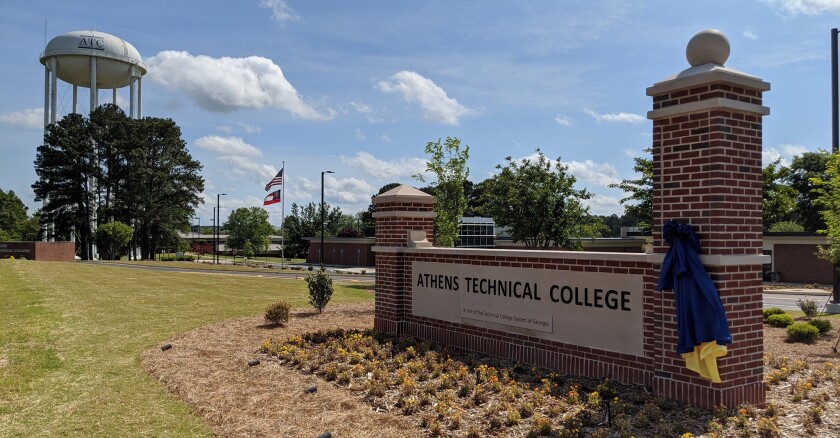Science
Georgia’s Dozier Highlights AI Integration in Workforce Skills

Commissioner Greg Dozier of the Technical College System of Georgia (TCSG) addressed the Marietta Rotary Club this week, emphasizing the importance of equipping individuals with the skills necessary for economic success. TCSG oversees 22 technical colleges across Georgia, focusing on enhancing workforce readiness through targeted education and training programs.
Dozier, who has held the commissioner role since his appointment by Gov. Brian Kemp in January 2020, leads a workforce of over 12,000 employees and manages an annual budget exceeding $1.1 billion. He expressed optimism regarding the current trajectory of TCSG, stating, “I don’t know if we’re in our golden era, but we’re in a really neat time for TCSG and how it’s being seen, but also how it’s setting the stage for this state and for the folks in this state.”
In 2024, TCSG served approximately 538,164 individuals, with enrollment figures reaching the highest level since 2013, totaling 148,000 students. Dozier reaffirmed the system’s mission: “Our mission is to truly make sure we have a globally competitive workforce for the state of Georgia.”
Focus Areas and Economic Impact
TCSG operates under five key pillars: technical education, adult education, economic development, workforce services, and the Quick Start program. These initiatives aim to prepare individuals for employment and enhance job opportunities across the state. The Quick Start program provides complimentary training and educational services to new businesses establishing operations in Georgia. Dozier explained, “Any new company coming to the state of Georgia gets a chance to qualify through the Department of Economic Development for Quick Start services.”
During the discussion, club member Sandeep Kapoor inquired about the integration of artificial intelligence (AI) within technical colleges. Dozier responded that TCSG is actively exploring ways to incorporate AI into educational programs. “We’re looking at it on instruction, how can AI enhance instruction, tutoring, how do we administer student use of AI, things of that nature,” he stated. He also noted the advancement of a curriculum that integrates AI, particularly in fields such as healthcare, manufacturing, and cybersecurity.
Kapoor expressed his satisfaction with Dozier’s insights, remarking, “I was very surprised in a positive way that they are considering AI as it impacts the careers and how the graduates are going to come out of the careers being able to work in a field where AI can be incorporated.”
Tuition Assistance and Future Opportunities
Another topic of interest was the potential for free tuition for students attending technical colleges. Dozier mentioned that for high-demand career paths—including construction, education, nursing, and cybersecurity—tuition can be covered through the HOPE Career Grant. This grant is designed to address workforce shortages in critical industries and is not based on academic performance but rather on skill acquisition. “It is purely a skill oriented grant opportunity,” he emphasized.
Concluding his remarks, Dozier expressed pride in TCSG’s mission: “I couldn’t be more proud to be part of an agency and a group of folks whose every day mission is to change the communities and the lives in our community.” Through its commitment to education and workforce development, TCSG aims to foster economic growth and improve the lives of individuals across Georgia.
-

 World2 days ago
World2 days agoCoronation Street’s Shocking Murder Twist Reveals Family Secrets
-

 Entertainment4 months ago
Entertainment4 months agoKate Garraway Sells £2 Million Home Amid Financial Struggles
-

 Entertainment3 months ago
Entertainment3 months agoAnn Ming Reflects on ITV’s ‘I Fought the Law’ Drama
-

 Health3 months ago
Health3 months agoKatie Price Faces New Health Concerns After Cancer Symptoms Resurface
-

 Entertainment3 weeks ago
Entertainment3 weeks agoCoronation Street Fans React as Todd Faces Heartbreaking Choice
-

 World3 weeks ago
World3 weeks agoBailey Announces Heartbreaking Split from Rebecca After Reunion
-

 World5 days ago
World5 days agoKevin Sinfield Exceeds Fundraising Goal Ahead of Final Marathons
-

 Entertainment3 months ago
Entertainment3 months agoCoronation Street’s Carl Webster Faces Trouble with New Affairs
-

 Entertainment5 days ago
Entertainment5 days agoTwo Stars Evicted from I’m A Celebrity Just Days Before Finale
-

 Entertainment3 months ago
Entertainment3 months agoWhere is Tinder Swindler Simon Leviev? Latest Updates Revealed
-

 Entertainment4 months ago
Entertainment4 months agoMarkiplier Addresses AI Controversy During Livestream Response
-

 Science2 months ago
Science2 months agoBrian Cox Addresses Claims of Alien Probe in 3I/ATLAS Discovery




















